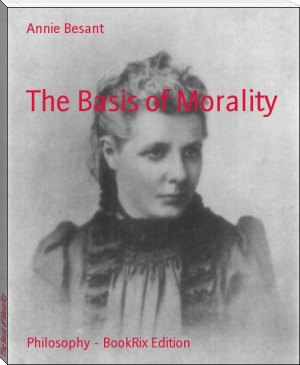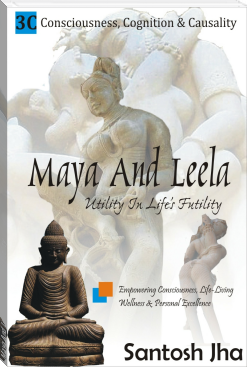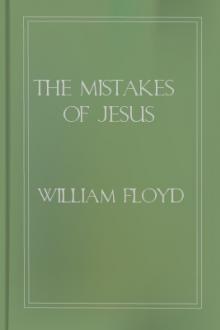The Basis of Morality - Annie Besant (books to read now .TXT) 📗

- Author: Annie Besant
- Performer: -
Book online «The Basis of Morality - Annie Besant (books to read now .TXT) 📗». Author Annie Besant
The true Mystic, realising God, has no need of any Scriptures, for he has touched the source whence all Scriptures flow. An "enlightened" Brāhmaṇa, says Shrī Kṛṣhṇa, has no more need of the Veḍas, than a man needs a tank in a place which is overflowing with water. The value of cisterns, of reservoirs, is past, when a man is seated beside an ever-flowing spring. As Dean Inge has pointed out, Mysticism is the most scientific form of religion, for it bases itself, as does all science, on experience and experiment—experiment being only a specialised form of experience, devised either to discover or to verify.
We have seen the Mystic who realises God outside himself and seeks Union with Him. There remains the most interesting, the most effective form of Mysticism, the realisation by a man of God within himself. Here meditation is also a necessity, and the man who is born with a high capacity for concentration is merely a man who has practised it in previous lives. A life or lives of study and seclusion often precede a life of tremendous and sustained activity in the physical world. The realisation is preceded by control of the body, control of the emotions and control of the mind, for the power to hold these in complete stillness is necessary, if a man is to penetrate into those depths of his own nature in which alone is to be found the shrine of the inner God. The subtle music of that sphere is drowned by the clatter of the lower bodies as the most exquisite notes of the Vīṇā are lost in the crude harsh sound of the harmonium. The Voice of the Silence can only be heard in the silence, and all the desires of the heart must be paralysed ere can arise in the tranquillity of senses and mind, the glorious majesty of the Self. Only in the desert of loneliness rises that Sun in all His glory, for all objects that might cloud His dawning must vanish; only "when half-Gods go," does God arise. Even the outer God must hide, ere the Inner God can manifest; the cry of agony of the Crucified must be wrung from the tortured lips; "My God, my God, why hast Thou forsaken me?" precedes the realisation of the God within.
Through this all Mystics pass who are needed for great service in the world, those whom Mr. Bagshot so acutely calls "materialised Mystics". The Mystics who find God outside themselves are the "unmaterialised" Mystics, and they serve the world in the ways above mentioned; but the other, as Mr. Bagshot points out, transmute their mystic thought into "practical energy," and these become the most formidable powers known in the physical world. All that is based on injustice, fraud and wrong may well tremble when one of these arises, for the Hidden God has become manifest, and who may bar His way?
Such Mystics wear none of the outer signs of the "religious"—their renunciation is within, not without, there is no parade of outer holiness, no outer separation from the world; Janaka the King, Kṛṣhṇa the Warrior-Statesman, are of these; clothed in cotton cloth or cloth of gold, it matters not; poor or rich, it boots not; failing or succeeding, it is naught, for each apparent failure is the road to fuller success, and both are their servants, not their masters; victory ever attends them, to-day or a century hence is equal, for they live in Eternity, and with them it is ever To-day. Possessing nothing, all is theirs; holding everything, nothing belongs to them. Misconception, misrepresentation, they meet with a smile, half-amused, all-forgiving; the frowns, the taunts, the slanders of the men they live to serve are only the proofs of how much these foolish ones need their help, and how should these foolish ones hurt those on whom the Peace of the Eternal abides?
These Mystics are a law unto themselves, for the inner law has replaced the external compulsion. More rigid, for it is the law of their own nature; more compelling, for it is the Voice of the divine Will; more exacting, for no pity, no pardon, is known to it; more all-embracing, for it sees the part only in the whole.
But it has, it ought to have, no authority outside the Mystic himself. It may persuade, it may win, it may inspire, but it may not claim obedience as of right. For the Voice of the God within only becomes authoritative for another when the God within that other self answers the Mystic's appeal, and he recognises an ideal that he could not have formulated, unaided, for himself. The Mystic may shine as a Light, but a man must see with his own eyes, and there lies the world's safety; the materialised Mystic, strong as he is, cannot, by virtue of the God within him, enslave his fellow-men.
THE VASANTA PRESS, ADYAR, MADRAS
End of the Project Gutenberg EBook of The Basis of Morality, by Annie Besant
*** END OF THIS PROJECT GUTENBERG EBOOK THE BASIS OF MORALITY ***
***** This file should be named 15545-h.htm or 15545-h.zip *****
This and all associated files of various formats will be found in:
http://www.gutenberg.net/1/5/5/4/15545/
Produced by Jonathan Ingram, David Garcia and the Online Distributed
Proofreading Team.
Updated editions will replace the previous one--the old editions
will be renamed.
Creating the works from public domain print editions means that no
one owns a United States copyright in these works, so the Foundation
(and you!) can copy and distribute it in the United States without
permission and without paying copyright royalties. Special rules,
set forth in the General Terms of Use part of this license, apply to
copying and distributing Project Gutenberg-tm electronic works to
protect the PROJECT GUTENBERG-tm concept and trademark. Project
Gutenberg is a registered trademark, and may not be used if you
charge for the eBooks, unless you receive specific permission. If you
do not charge anything for copies of this eBook, complying with the
rules is very easy. You may use this eBook for nearly any purpose
such as creation of derivative works, reports, performances and
research. They may be modified and printed and given away--you may do
practically ANYTHING with public domain eBooks. Redistribution is
subject to the trademark license, especially commercial
redistribution.
*** START: FULL LICENSE ***
THE FULL PROJECT GUTENBERG LICENSE
PLEASE READ THIS BEFORE YOU DISTRIBUTE OR USE THIS WORK
To protect the Project Gutenberg-tm mission of promoting the free
distribution of electronic works, by using or distributing this work
(or any other work associated in any way with the phrase "Project
Gutenberg"), you agree to comply with all the terms of the Full Project
Gutenberg-tm License (available with this file or online at
http://gutenberg.net/license).
Section 1. General Terms of Use and Redistributing Project Gutenberg-tm
electronic works
1.A. By reading or using any part of this Project Gutenberg-tm
electronic work, you indicate that you have read, understand, agree to
and accept all the terms of this license and intellectual property
(trademark/copyright) agreement. If you do not agree to abide by all
the terms of this agreement, you must cease using and return or destroy
all copies of Project Gutenberg-tm electronic works in your possession.
If you paid a fee for obtaining a copy of or access to a Project
Gutenberg-tm electronic work and you do not agree to be bound by the
terms of this agreement, you may obtain a refund from the person or
entity to whom you paid the fee as set forth in paragraph 1.E.8.
1.B. "Project Gutenberg" is a registered trademark. It may only be
used on or associated in any way with an electronic work by people who
agree to be bound by the terms of this agreement. There are a few
things that you can do with most Project Gutenberg-tm electronic works
even without complying with the full terms of this agreement. See
paragraph 1.C below. There are a lot of things you can do with Project
Gutenberg-tm electronic works if you follow the terms of this agreement
and help preserve free future access to Project Gutenberg-tm electronic
works. See paragraph 1.E below.
1.C. The Project Gutenberg Literary Archive Foundation ("the Foundation"
or PGLAF), owns a compilation copyright in the collection of Project
Gutenberg-tm electronic works. Nearly all the individual works in the
collection are in the public domain in the United States. If an
individual work is in the public domain in the United States and you are
located in the United States, we do not claim a right to prevent you from
copying, distributing, performing, displaying or creating derivative
works based on the work as long as all references to Project Gutenberg
are removed. Of course, we hope that you will support the Project
Gutenberg-tm mission of promoting free access to electronic works by
freely sharing Project Gutenberg-tm works in compliance with the terms of
this agreement for keeping the Project Gutenberg-tm name associated with
the work. You can easily comply with the terms of this agreement by
keeping this work in the same format with its attached full Project
Gutenberg-tm License when you share it without charge with others.
1.D. The copyright laws of the place where you are located also govern
what you can do with this work. Copyright laws in most countries are in
a





Comments (0)